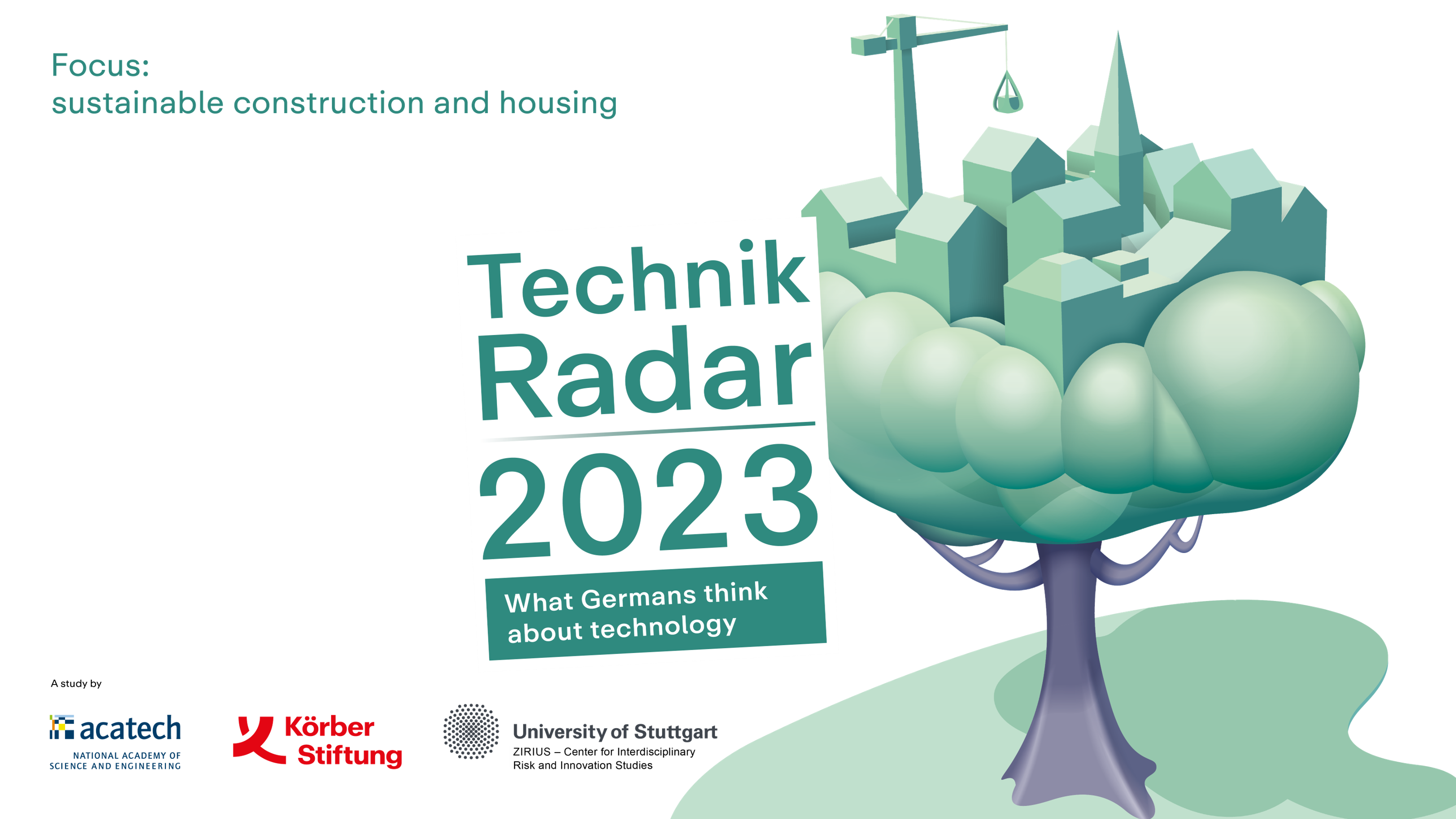TechnikRadar 2019: What Europeans think about the digital transformation

Berlin, 28 May 2019
Germans are less optimistic than other Europeans about the opportunities of digitalisation. This is one of the findings of TechnikRadar 2019, which is being presented today in Berlin by acatech – National Academy of Science and Engineering and the Körber Foundation. The study compares the results of the authors’ own representative survey in Germany with international studies.
Just two days after the European elections, TechnikRadar 2019 reveals differences in how people across Europe feel about the opportunities of digitalisation. Overall, opinion in Germany falls somewhere in the middle of the spectrum. Although Germans tend to be less optimistic than other Europeans, there are some exceptions. For example, they are relatively bullish about the economic impacts of digitalisation. 82% of Germans think that digitalisation will have a positive impact on the economy – slightly more than in Sweden (79%) and significantly more than the European average of 75%.
According to Cordula Kropp, a sociologist at the University of Stuttgart’s Center for Interdisciplinary Risk and Innovation Studies and the project’s lead researcher, the findings can be interpreted in the following terms: “Perceptions and opinions with regard to the digital transformation vary greatly across Europe. People tend to have a more critical attitude towards digitalisation if they perceive it as something that they are powerless to influence. On the other hand, people who regard themselves as relatively competent users of digital technology and have confidence in the institutional regulation of digitalisation tend to be more optimistic about their ability to influence it and the opportunities that it has to offer. Germany is in the middle of the spectrum in this regard, somewhere between Scandinavia and southern Europe.” TechnikRadar 2019 found that the Danes, the Swedes and the Dutch rate their digital competence as above average and also have more positive than average expectations about digitalisation. Meanwhile, people in Germany are only averagely confident about their own digital skills and this is reflected in their levels of optimism, which are also close to the European average.
“Other countries in Europe are showing us how to seize the opportunities offered by digitalisation”, says Lothar Dittmer, Chairman of the Executive Board of the Körber Foundation. “We need a bolder attitude towards future technologies in Germany, otherwise we could jeopardise our prosperity and our position as a global leader in technology and innovation.”
Digital governance: people have more faith in businesses than in the EU
Opinions vary across Europe on the question of whether businesses, national authorities or the EU are best placed to regulate the impacts of the latest digital technologies. 20% believe that businesses should be responsible for the governance of digitalisation. 19% feel that responsibility should be shared between all three actors, while 16% think that the national authorities should be responsible. In Germany, the proportion of people who believe that businesses should be responsible for digital governance is even higher, at 27%. Just 13% think that the EU should be responsible.
Age and digitalisation: In Sweden, older people are as optimistic as younger people
In Sweden, where people rate their own digital competence relatively highly, expectations with regard to digital technology are similarly positive among both the over-65s and the digital natives (under-35s). However, there is a clear difference between these age groups in countries like Germany, which do not perceive themselves as being advanced with regard to digitalisation and in which respondents only rate themselves as averagely competent at using digital applications. The over-65s in Germany are significantly less optimistic about new technologies than young people. Interestingly, this is an age-related rather than a generational effect. Almost everywhere in Europe, the older people get, the more sceptical they become, with the effect being particularly pronounced in the oldest age group where people do not have to use digital technology for their work. “Nevertheless, in addition to an overall decline in scepticism towards digital technology, we found that familiarity with this technology is increasing, even among older people”, says Ortwin Renn, member of acatech’s Executive Board and Scientific Director at the IASS Potsdam. “Increased familiarity is accompanied by greater confidence in our ability to make the most of the opportunities offered by digital technology and limit the associated risks. This is a positive effect that we will continue to track through TechnikRadar, an annual monitoring programme that operates as a long-term early warning system.”
One in two Europeans uncomfortable with the idea of robot carers
When you get older, or if a time comes when you require care, how comfortable would you be with the idea of having a robot to look after you and keep you company? 51% of people in Europe are uncomfortable with this scenario, and the percentages are even higher in southern Europe (76% in Greece, 71/% in Portugal and 62% in Spain). On the other hand, willingness to accept technical assistance is higher than average in Poland (45%), the Czech Republic (42%) and the Baltic states, while the figure for Germany (27%) is close to the European average of 26%.
Germans cautious about online access to medical records
Europeans are divided about whether people should be able to access medical records online – there is a narrow majority in favour (52%), but 43% are opposed. While 82% of people in Finland would like to have online access to their own medical records, the figure for Germany is just 38%. People’s views are influenced by their age and education: 64% of under-40s in Europe would like online access to their own medical records, but this falls to just 38% among the over-54s. Similarly, while only 27% of people in the least-educated group are in favour, the figure for the most-educated group is as high as 66%.
About TechnikRadar
TechnikRadar is a survey carried out by acatech – National Academy of Science and Engineering and the Körber Foundation to find out what Germans think about technology. The University of Stuttgart’s Center for Interdisciplinary Risk and Innovation Studies produces the survey and analyses the results. TechnikRadar 2019 compares the findings of the 2018 survey with international studies of attitudes in several other European and some non-European countries. It also looks at how age and gender influence people’s views, as well as comparing the opinions of people in Germany and other European countries with regard to future digital applications in their everyday lives such as e-health, autonomous driving and robot carers.



